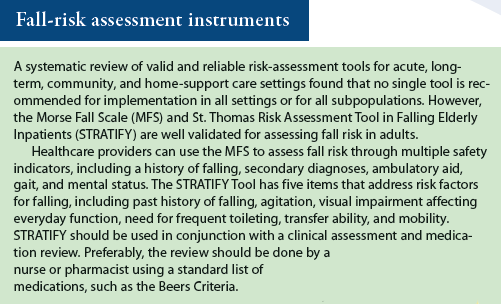The 2-Minute Rule for Dementia Fall Risk
The 2-Minute Rule for Dementia Fall Risk
Blog Article
Dementia Fall Risk for Beginners
Table of ContentsThe Only Guide to Dementia Fall RiskFacts About Dementia Fall Risk UncoveredEverything about Dementia Fall RiskAn Unbiased View of Dementia Fall RiskDementia Fall Risk - Truths
The FRAT has three sections: drop risk standing, danger factor list, and activity plan. An Autumn Risk Standing includes data concerning history of current falls, medications, emotional and cognitive status of the person - Dementia Fall Risk.If the individual scores on a threat element, the matching number of factors are counted to the individual's loss risk score in package to the much right. If a client's loss threat rating totals five or greater, the person is at high danger for drops. If the individual ratings just 4 points or reduced, they are still at some danger of falling, and the nurse must use their best scientific assessment to manage all fall risk elements as part of an all natural care strategy.
These standard techniques, in basic, aid create a secure setting that minimizes unexpected falls and marks core preventive steps for all individuals. Indications are vital for individuals at threat for falls.
The 5-Second Trick For Dementia Fall Risk
For example, wristbands should consist of the patient's last and very first name, date of birth, and NHS number in the UK. Details must be printed/written in black versus a white background. Just red shade needs to be used to indicate special individual standing. These recommendations follow existing developments in individual identification (Sevdalis et al., 2009).
Things that are too much might require the patient to get to out or ambulate unnecessarily and can possibly be a hazard or add to falls. Aids stop the patient from going out of bed with no support. Nurses react to fallers' phone call lights quicker than they do to lights started by non-fallers.
Visual impairment can considerably cause falls. Keeping the beds closer to the floor minimizes the danger of drops and major injury. Putting the cushion on the floor significantly decreases loss danger in some healthcare setups.
An Unbiased View of Dementia Fall Risk
People who are high and with weak leg muscles who try to remain on the bed from a standing position are likely to drop onto the bed due to the fact that it's as well reduced for them to reduce themselves securely. Also, if a high individual attempts to rise from a low bed without support, the person is likely to drop back down onto the bed or miss the bed and fall onto the flooring.
They're developed to promote timely rescue, not to stop falls from bed. special info Apart from bed alarms, increased supervision for high-risk clients likewise might assist avoid drops.

Clients with a shuffling stride boost autumn possibilities drastically. To reduce fall danger, shoes ought to be with a little to no heel, slim soles with slip-resistant tread, important link and support the ankle joints. Recommend patient to utilize nonskid socks to avoid the feet from gliding upon standing. Motivate people to put on appropriate, well-fitting shoesnot nonskid socks for ambulation.
Dementia Fall Risk Things To Know Before You Get This
People, especially older adults, have actually decreased aesthetic capability. Lights an unfamiliar environment assists raise exposure if the person should obtain up in the evening. In a research study, homes with adequate illumination record fewer falls (Ramulu et al., 2021). Renovation in illumination in the house may decrease loss prices in older grownups (Dementia Fall Risk). Making use of stride belts by all healthcare carriers can promote safety and security when assisting clients with transfers from bed to chair.

Sitters are reliable for guaranteeing a safe and secure, secured, and risk-free atmosphere. Studies showed really low-certainty proof that caretakers decrease autumn danger in intense treatment medical facilities and only moderate-certainty that alternatives like video clip monitoring can lower caretaker usage without enhancing fall risk, recommending that sitters are not as helpful as at first believed (Greely et al., 2020).
Rumored Buzz on Dementia Fall Risk

Boosted physical conditioning reduces the threat for falls and restricts injury that is endured when fall takes place. Land and water-based exercise programs might be similarly valuable on equilibrium and gait and thereby minimize the risk for falls. Water exercise might contribute a favorable benefit on balance and stride for females 65 years and older.
Chair Surge Exercise is a straightforward sit-to-stand exercise that aids enhance the muscles in the thighs and butts and improves wheelchair and independence. The goal is to do Chair Surge exercises without using hands as the client comes to be stronger. See resources area for a thorough direction on just how to do dig this Chair Increase exercise.
Report this page